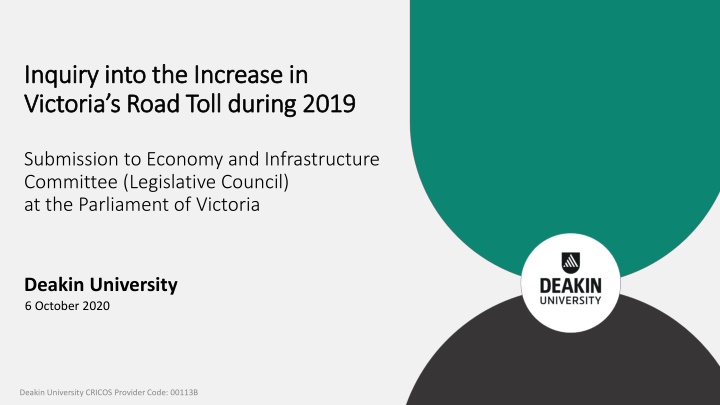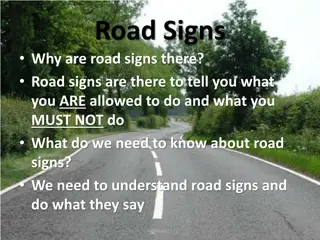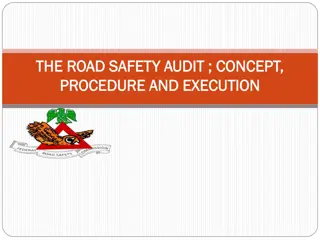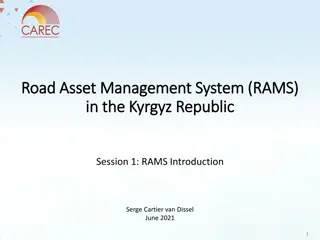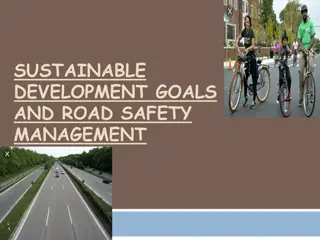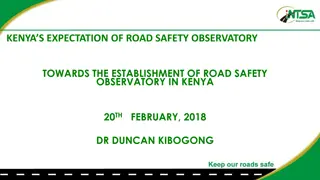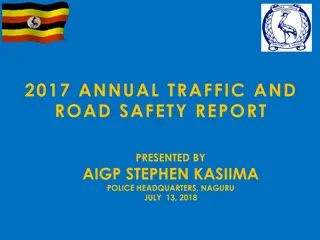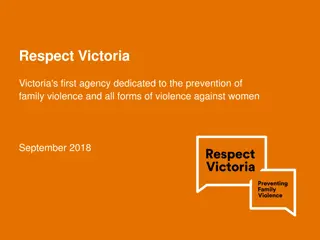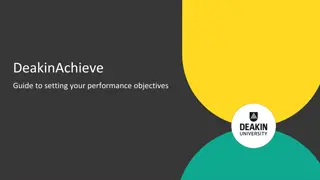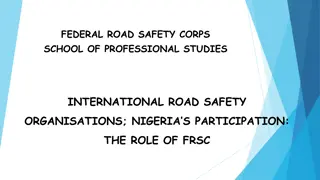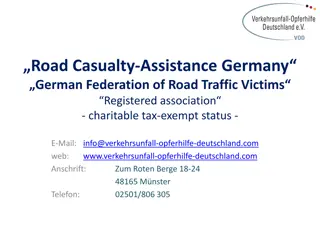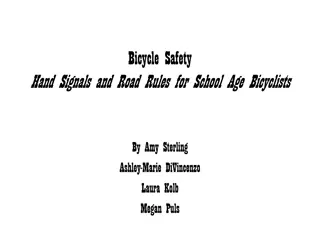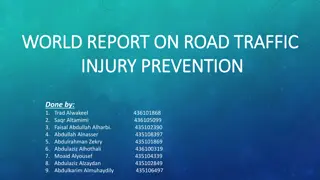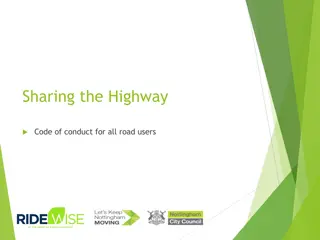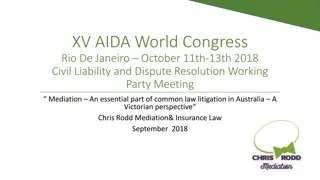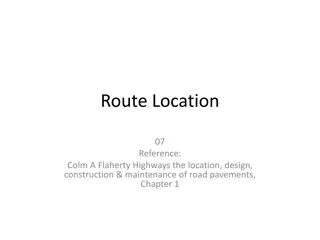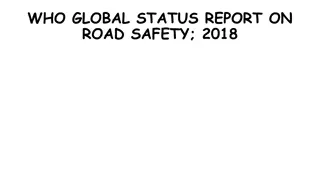Road Safety Research and Education in Victoria by Deakin University
Deakin University is a leading institution in driving road safety research and education, focusing on innovative solutions and data analytics. The multidisciplinary research team, consisting of experts in various fields, contributes significantly to advancing road safety in Victoria and beyond.
Download Presentation

Please find below an Image/Link to download the presentation.
The content on the website is provided AS IS for your information and personal use only. It may not be sold, licensed, or shared on other websites without obtaining consent from the author.If you encounter any issues during the download, it is possible that the publisher has removed the file from their server.
You are allowed to download the files provided on this website for personal or commercial use, subject to the condition that they are used lawfully. All files are the property of their respective owners.
The content on the website is provided AS IS for your information and personal use only. It may not be sold, licensed, or shared on other websites without obtaining consent from the author.
E N D
Presentation Transcript
Inquiry into the Increase in Inquiry into the Increase in Victoria s Road Toll during 2019 Victoria s Road Toll during 2019 Submission to Economy and Infrastructure Committee (Legislative Council) at the Parliament of Victoria Deakin University 6 October 2020 Deakin University CRICOS Provider Code: 00113B Deakin University CRICOS Provider Code: 00113B
Deakin at a Glance Deakin at a Glance Deakin s vision is to be Australia s premier university in driving the digital frontier, enabling globally connected education for the jobs of the future and research that makes a difference to the communities we serve. Top 1% of universities worldwide Ranked in the Top 50 young universities in the world Highest level of overall student satisfaction among universities in the Australian State of Victoria for ten years in a row Shanghai Rankings Academic Ranking of World Universities 2019 2 Deakin University CRICOS Provider Code: 00113B COMMERCIAL-IN-CONFIDENCE
Deakin University & Road Safety Research Deakin University & Road Safety Research Deakin makes significant contributions to road safety research and education in Victoria, nationally and internationally. Our focus is on a new era of road data and systems analysis, and the combining of complementary research strengths to deliver better innovations and solutions. The application of knowledge representation and reasoning techniques to problems relating to intelligent agent systems, machine learning, optimisation, goal modelling, service science and business process management is uniquely supported by multidisciplinary experts working across diverse and relevant areas (i.e., road safety, traffic management, safety evaluation, business and law, public health, psychology, medicine, advanced manufacturing and engineering). This combination enables new advances using data analytics and machine learning in the area of informed decision making and the development of simulation and goal-oriented autonomous systems. 3 Deakin University CRICOS Provider Code: 00113B COMMERCIAL-IN-CONFIDENCE
Multidisciplinary Deakin Research Team Multidisciplinary Deakin Research Team Research Team Member ToR Role Expertise Prof Chris McConville All Pro Vice Chancellor for Research, Strategy & Performance Dr Ashim Debnath ToR 1 ToR 3 ToR 8 Senior Lecturer in Transportation Engineering Road safety analysis, Vulnerable Road Users (including cyclists) Prof Saeid Nahavandi ToR 5 Director of the Institute for Intelligent Systems Research and Innovation Modeling of complex systems, robotics and haptics, collision avoidance technologies, autonomous vehicles Prof Kon Mouzakis ToR 4 ToR 6 Co-Director of the Applied Artificial Intelligence Institute Software and Technology Innovation A/Prof Ben Horan ToR 7 Director of the Centre for Advanced Design in Engineering Training (CADET) Virtual Reality (VR) Lab AR/VR, haptics mechatronics, and Human Computer Interaction (HCI) Dr Jan Garrard ToR 1 Senior Lecturer, School of Health and Social Development Physical activity, active transport, women's participation in cycling, and cycling safety Prof John Toumbourou / Rebecca Bartel ToR 2 ToR 3 Chair in Health Psychology Co-Director of the Strategic Centre for Mental Health and Wellbeing Research Evaluation, drug abuse prevention and treatment, and the role of community, family and peer groups in adolescent health promotion 4 Deakin University CRICOS Provider Code: 00113B
ToR ToR 1. Current Victorian Towards Zero Road Safety Strategy 2016 Current Victorian Towards Zero Road Safety Strategy 2016- -2020 and progress towards its aim of a 20 per cent reduction in fatalities with 200 or less lives lost annually by 2020 aim of a 20 per cent reduction in fatalities with 200 or less lives lost annually by 2020 1. 2020 and progress towards its Deakin Recommendations: Dr. Ashim Debnath and Dr. Jan Garrard 1.1: Deakin proposes TAC s consideration of new innovative methodologies including information ecosystems, data analytics and the internet of things to support a range of requirements from review of general fatalities and casualties to intelligent support systems, particularly in the west of Victoria. 1.2A: To improve vulnerable road user safety, Deakin University recommends the incorporation of the Motorcycle Clothing Assessment Program (MotoCAP) in future road safety strategies and campaigns. 1.2B: In a post-COVID environment, Deakin University recommends that road safety targets and strategies aim to improve the safety of all road users, with an increased focus on Vulnerable Road Users (VRUs). 1.3: In addition to the Safe System approach, Deakin University recommends that preventative frameworks such as the Social- Ecological model contribute to the design of more comprehensive and innovative road safety measures to benefit all road users. 1.4: Deakin University recommends the inclusion of near-misses and non-fatal crashes, in addition to fatal crashes, in developing safety improvement policies and treatments for Victoria. Deakin University also warrants the need for appropriate exposure measures and longer study durations in safety studies due to population and travel growth and likely random yearly fluctuations in crash counts. 5 Deakin University CRICOS Provider Code: 00113B COMMERCIAL-IN-CONFIDENCE
ToR ToR 2. Adequacy and scope of the current driver drug and alcohol testing regime Adequacy and scope of the current driver drug and alcohol testing regime 2. Deakin Recommendations: Professor John Toumbourou 2.1: To reduce the risk of adolescent and young adult DUI, Deakin University recommends that prevention efforts be designed to target the predictive relationship between riding with a drinking driver in the teen years and subsequent DUI in young adulthood. This effort could engage adult drivers (especially parents) who act as role models for adolescents riding in vehicles with them as well as adolescent passengers, and complement existing evidence-based interventions including school-based instructional programs, graduated drivers' licensing and zero tolerance BAC laws for young and inexperienced drivers. 2.2: To address the rising risk of DUI among women of all ages, Deakin University recommends investment in gender specific research to reduce alcohol-related harm, associated drink driving behaviour and to inform future policy and awareness campaigns. 6 Deakin University CRICOS Provider Code: 00113B COMMERCIAL-IN-CONFIDENCE
ToR ToR 3. Adequacy of current speed enforcement measures and speed management policies Adequacy of current speed enforcement measures and speed management policies 3. Deakin Recommendations: Dr. Ashim Debnath and Professor John Toumbourou 3.1: Deakin University recommends the extension of Victoria s speed camera program combined with lower posted speed limits in areas where vulnerable road users are present. 3.2: While speed enforcement is recognised as an important tool to help keep drivers at the speed limit, Deakin University recommends continued funding support for training and communications to change driver attitudes, including at roadworks, and promote a change in culture as a necessary adjunct to enforcement. 3.3: Speeding at roadwork zones requires significant attention as many drivers violate posted roadwork speed limits posing significant dangers to both motorists and roadworkers. Given the scale of road infrastructure improvement works underway in Victoria this is of key relevance to the Victorian road safety programs. Deakin University recommends focused data analysis of all relevant datasets relating to speeding, road safety hazards and crash related issues at roadwork zones to facilitate the development of evidence-based prevention strategies to improve the safety of motorists and roadworkers in cooperation with the TAC and WorkSafe. 7 Deakin University CRICOS Provider Code: 00113B COMMERCIAL-IN-CONFIDENCE
ToR ToR 4. Adequacy of current response to smart phone use, including the use of technology to Adequacy of current response to smart phone use, including the use of technology to reduce the impact of smart phone use on driver distraction reduce the impact of smart phone use on driver distraction 4. Deakin Recommendations: Professor Kon Mouzakis 4.1: Deakin University has a detailed understanding of mobile phone detection camera operations operable in other jurisdictions and recommends a trial of mobile phone detection cameras in Victoria. Deakin researchers will continue to develop research to further enhance and optimise the capability of this technology. 8 Deakin University CRICOS Provider Code: 00113B COMMERCIAL-IN-CONFIDENCE
ToR ToR 5. Measures to improve the affordability of newer vehicles incorporating Measures to improve the affordability of newer vehicles incorporating driver assist technologies driver assist technologies 5. Deakin Recommendations: Professor Saeid Nahavandi 5.1: To be fully prepared for the introduction of new and innovative collision avoidance technologies and autonomous vehicles that will disrupt current road safety and automotive sector frameworks, Deakin University recommends: government commission research to evaluate safety, legal and societal impacts work with the sector through this transition to ensure maximal community benefit and appropriate consumer costing models and provide leadership to ensure community acceptance. 9 Deakin University CRICOS Provider Code: 00113B COMMERCIAL-IN-CONFIDENCE
ToR ToR 6. Adequacy of current road standards and the road asset maintenance regime Adequacy of current road standards and the road asset maintenance regime 6. Deakin Recommendations: Professor Kon Mouzakis 6.1: Analogous to the application of data analytics in road traffic safety and asset management, Deakin University recommends the development of AI prospective risk assessment tools through spatial road safety risk assessment and other methodologies. These predictive tools will specifically target high-risk roads and locations, including on high-speed and low-volume roads, and significantly enhance black spot prediction capability. Predicting Black-Spot and Road Fatalities Algorithms that predict where and when crashes are likely to happen could help reduce the number of road fatalities. 10 Deakin University CRICOS Provider Code: 00113B COMMERCIAL-IN-CONFIDENCE
ToR ToR 7. Adequacy of driver training programs and related funding structures such as the L2P program Adequacy of driver training programs and related funding structures such as the L2P program 7. Deakin Recommendations: Professor Ben Horan 7: Deakin University recommends the application of modern virtual reality and simulation technologies in driver training programs and licencing systems to influence driver attitudes and ensure drivers have adequate exposure to complex and difficult-to-access driving scenarios particularly for younger and older driver groups and to improve the safety of vulnerable road users including cyclists, pedestrians and motorcyclists. 11 Deakin University CRICOS Provider Code: 00113B COMMERCIAL-IN-CONFIDENCE
ToR ToR 8. Aadequacy adequacy and accuracy of road collision data collection and accuracy of road collision data collection 8. Deakin Recommendations: Dr. Ashim Debnath 8: Deakin University recommends a comprehensive review of the crash data collection and reporting system c to identify areas where detailed data are not collected including: Examination of crash data collection procedures to develop a centralised and streamlined procedure for multiple data sources and reducing/eliminating under-reporting issues in crash records, particularly for crashes involving vulnerable road users and those that occur at roadwork zones; and, Collection and analysis of alternative sources of safety data, including near-misses and user reported safety data. 12 Deakin University CRICOS Provider Code: 00113B COMMERCIAL-IN-CONFIDENCE
Questions Answers Q&A Q&A 13 Deakin University CRICOS Provider Code: 00113B COMMERCIAL-IN-CONFIDENCE
